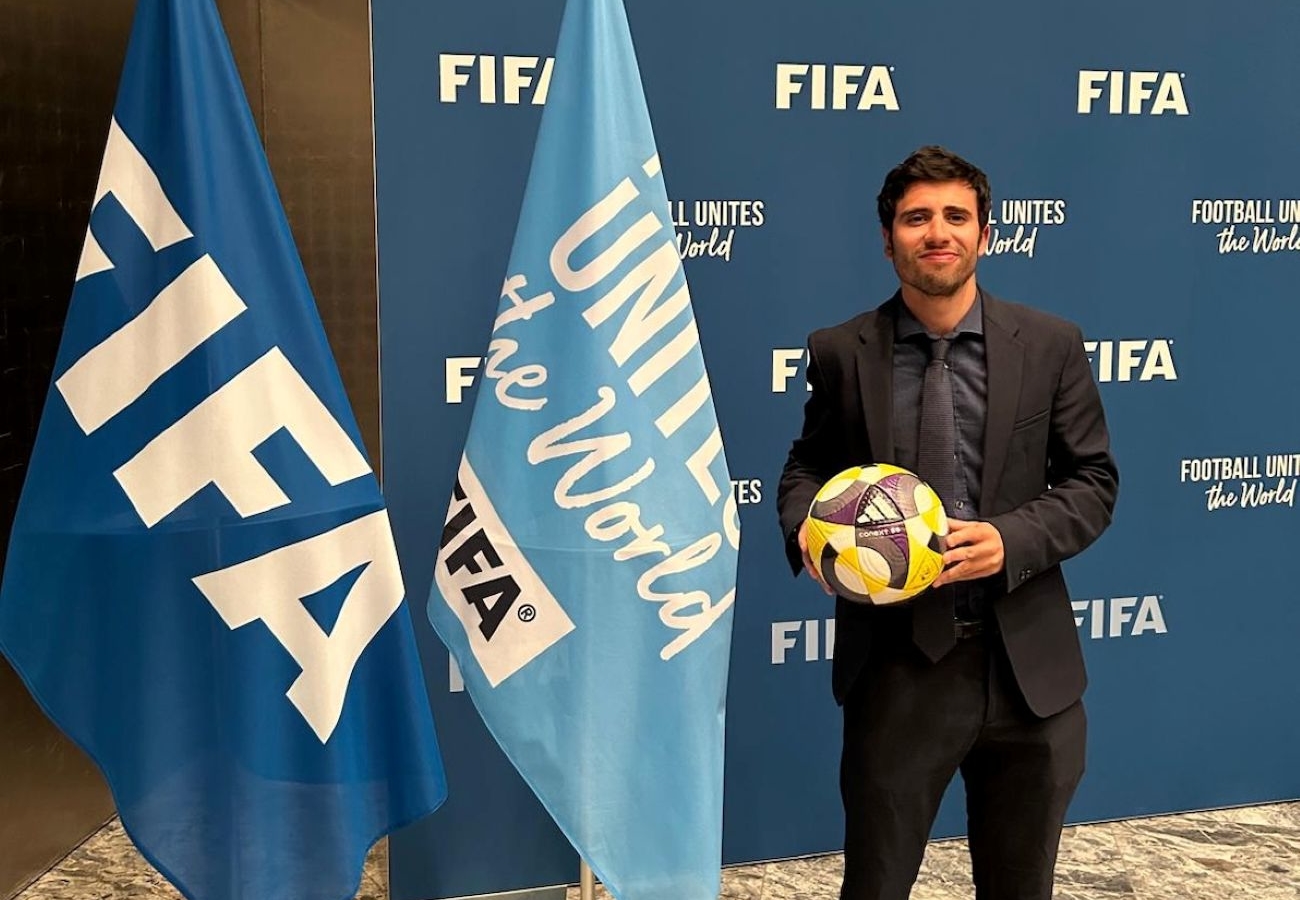FLUENT IN FOOTBALL - VITOR RECCHIA (FIFA MASTER 25th EDITION)

On his first day at French school, five-year-old Vitor Recchia couldn’t understand much of what the teacher said. Born in Brazil to a family with French Algerian roots, Vitor was already learning the art of balancing cultures before he could spell his name. “I was born and raised in Brazil, so I consider myself 100 per cent Brazilian,” Vitor says. “My grandfather came to Brazil from a French Algerian family when he was little and lived all his life in Brazil. Then my dad and his brothers also learnt French. My grandmother became a French teacher.” So, for Vitor, French was never far. It was in his grandparents’ migration story, his father’s education, and eventually, in the French immersion school his parents chose for him. This blend of cultures sparked something early in Vitor: an instinctive openness to learning that would shape everything that would come next.
Just four floors down from his apartment lived a woman who quietly rewrote Vitor’s childhood. She was his language teacher, a multilingual marvel in her 80s who believed in him from the ripe age of four. “She knew probably seven or eight languages,” Vitor recalls. Over the next 10 years, with her guidance, Vitor would master French, English, and Spanish. “I remember at her 90th birthday she said to me, ‘Next I’m going to teach you Italian, then German, and then Arabic and you're going to know all the languages I know.” Her faith in him lit a fire he never let go of. But Vitor’s real learning wasn’t confined to the classroom. It was during recess, on the football pitch, where he found his voice.
When middle school got rough, football became Vitor’s escape, his therapy, and his form of connection. “At the end of the year, my mom just took me out of school because I was really unwell. But I know during that year what really helped me was playing football.” Others had noticed too. When Vitor returned to school after the break, some high school classmates urged him to start playing with them instead of his middle school classmates. “They said, ‘come play with us in the high school court.’ And, so, through to the end of the year I always played with their team. That’s what helped me throughout the year.” And just like that, football wasn’t just a sport, it was another language he adopted into his vernacular, another one he understood fluently – and one that he would return to again and again throughout his life.
At 17, Vitor left behind not just his family, but a life he had built with classmates and friends to take a risk on something bigger in the U.S. “When I was in high school, what I really liked was doing sport. When the time came to decide what I wanted to study, all that I knew was that I wanted to keep doing sport. Then I found out that in the United States you could study and do sports at the same time. I knew that’s what I wanted to do.”
Because of the seasonal differences in school years amongst the respective hemispheres, Vitor completed a semester at University of São Paulo (USP) during the first half of the calendar year. In that time, Vitor supported what became a vibrant network of sports competitions akin to what he was eagerly anticipating in the U.S. There were daily practices and interdepartmental matches between management, economics, and psychology students on the football pitch, track, and tennis court. Vitor was living the student-athlete dream before he’d even left for America. For a moment, Vitor hesitated. “If I’m very honest, there was a side of me that almost said, ‘I don’t want to go to the U.S. anymore.’” He had built something real. But something deeper reminded him why he’d dreamed of this in the first place, so he took a leap that brought him to Penn State. It wasn’t an easy choice, but it felt like a step towards a different kind of victory, one defined not by wins, but by courage.
Penn State wasn’t just a new school, it turned out. It was a test of independence. Vitor was far from home, adjusting to new systems, new people, and even new weather patterns. But learning, challenge, and growth had never been things he’d turned away from. From a sports perspective, Penn State turned out to be everything Vitor had dreamed of – perhaps more. From practicing with the varsity soccer team, taking up competitive distance running, and even refereeing, Vitor experienced the full scope of the American college sports system. “The intramurals were huge. We got 200, 300 teams every season, which also meant they needed plenty of refs, so I got a job as a ref during my first year. I thought that I was only going to ref soccer, but then they put me in flag football. I knew American football, but I had to study the rules. Then I refed basketball too.”
Perhaps Vitor’s shining intramural moment was the legacy he built with Penn State’s Corinthians team, named after his local club in São Paulo. He recruited relentlessly. Corinthians kept winning. Word spread. “We had a crazy good team,” Vitor smiles. “Everybody knew us.” It felt like living inside a college movie: random people pointing them out on campus, calling out, “Hey, you play for Corinthians, right?” Ten years later, Pennsylvania’s Corinthians still runs with fervor. “The team still plays, and I don’t even know if they know what Corinthians is, but they still call it Corinthians,” Vitor says proudly.
After graduation, Vitor’s path zigzagged again – from finance to football – where passion finally met profession. An internship in Paris between his junior and senior year (and football sessions with some locals) had set Vitor up nicely for a return to France’s capital city. He started his career in finance, influenced by his academic background. But even while working with numbers, Vitor couldn’t ignore the pull of something else.
Football, of course, was never far away. Eventually, he went from playing games to also helping run them, taking on a role at a Championnet Sports football club in Paris that combined his financial know-how with a setting that aligned with the core of who he was. At the club, Vitor wasn’t just managing operations, he was building relationships. “It was one of the most important things in my life for those six years,” Vitor says. “We created a multicultural club in the senior team with over 50 nationalities – maybe more.” During that time, he was also elected to the club’s board as vice president. The president of the board, someone Vitor had first met years earlier playing pickup while in Paris for his internship, would go on to become his closest friend and collaborator. Together, they pushed for meaningful changes at the operational level, including convincing the executive committee to update systems to better support immigrant players from Africa. Throughout it all, he saw firsthand how a well-run club could impact a community. As a kid who had searched for and found solace on the pitch during recess, he didn’t take that lightly.
That period in Paris validated for Vitor that work didn’t have to be disconnected from passion. (He jokes that his club experience provided an “avant-gout” (“taster”) of what he’d encounter amongst such a diverse group in the FIFA Master.) And it gave him the clarity to realize he didn’t want to just work in football; he wanted to help shape the future of the game itself. This realization led him to where he is now, as a member of the 25th edition of the FIFA Master, a programme that has challenged him intellectually and offered him the chance to merge everything he cares for into one. “I had a good job with a good salary and I was team captain, vice president of the club, but I also knew I couldn’t give up this opportunity, this adventure,” Vitor says of traveling across Europe throughout the programme.
Joining the FIFA Master was a continuation of Vitor’s lifelong relationship with language. And not just spoken languages (though he’s fluent in several), but the language of sport, of connection. Since childhood, he’s moved between Portuguese, French, English, Spanish, between cultures, teams, and cities. Now, with stories stitched across Brazil, the U.S., and France (and England, Italy, and Switzerland), Vitor is building a new kind of fluency, one that brings people together without the need for translation.
By Geneva Decker
FIFA Master 25th edition student
FIFA Master - International Master in Management, Law and Humanities of Sport, ranked Europe's No.1 course a record 12 times by SportBusiness.
FIFA Master - 25 years of Excellence in Sport Business Education - organised by CIES in partnership with De Montfort University (UK), SDA Bocconi School of Management (Italy) and the University of Neuchâtel (Switzerland).









